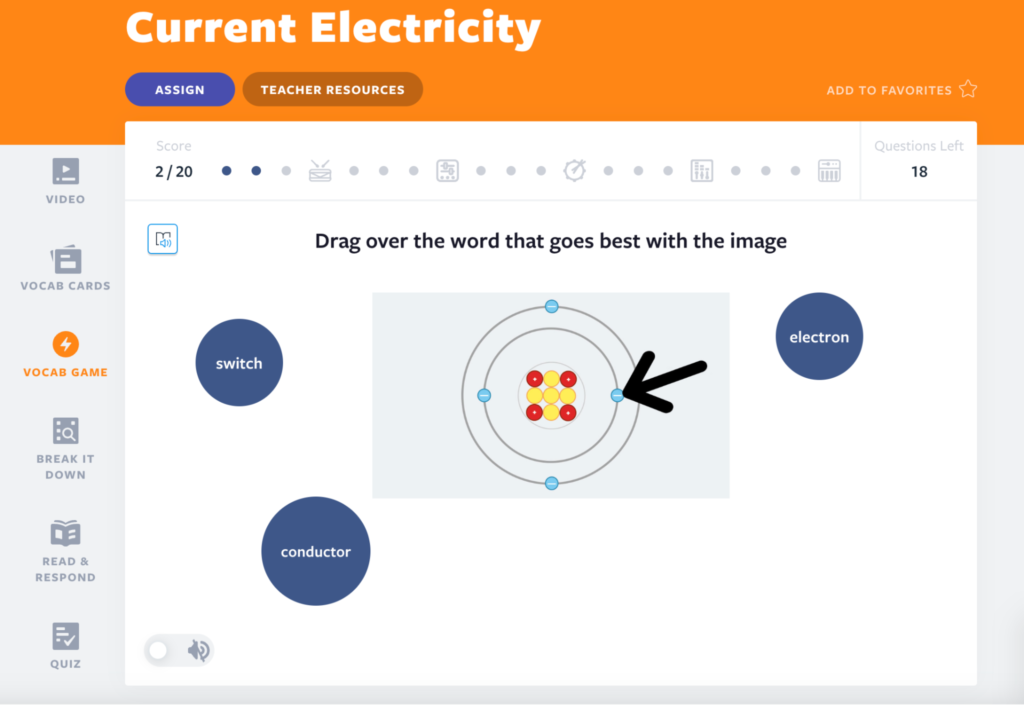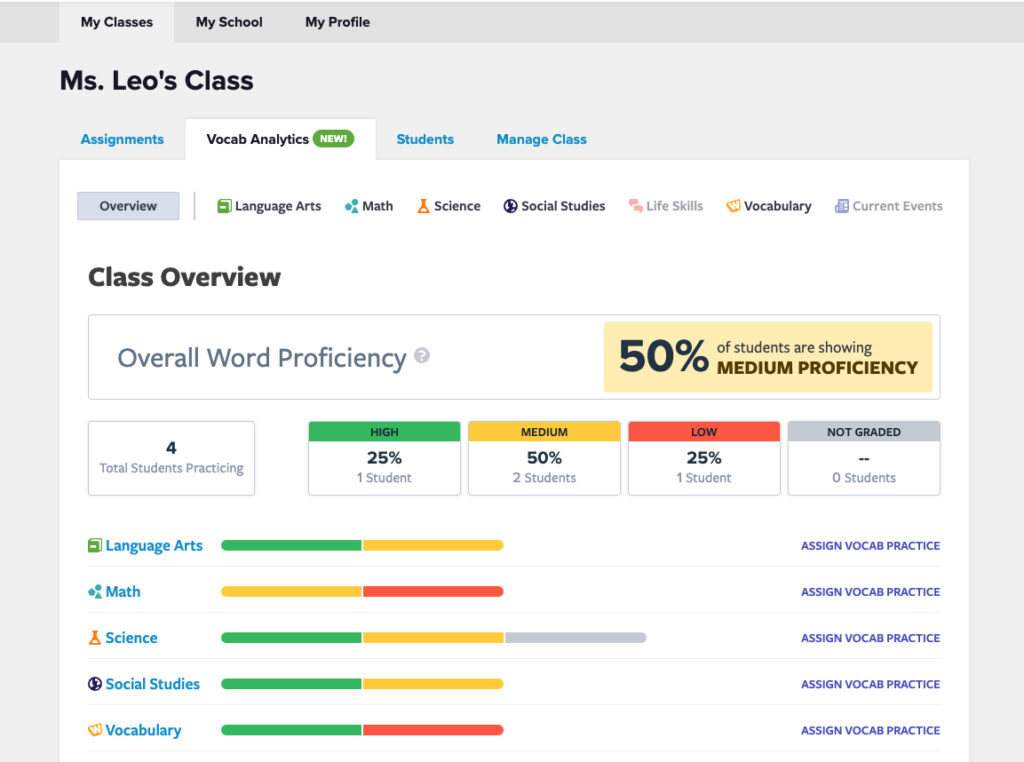
5 Reasons to use the Vocab Game activity
Teaching subject-specific and general academic vocabulary words is part of Flocabulary’s DNA. Every Flocabulary lesson contains key vocabulary words selected by our curriculum team to help support student comprehension of lesson content. As students move through the Flocabulary lesson sequence, they’re exposed to vocabulary words multiple times in various contexts.
Equally foundational to Flocabulary’s instructional approach is, of course, music! Put the two together, and you get one of our most popular activities, the Flocabulary Vocab Game. Read on to learn how to use the Vocab Game to add rhythm to your vocabulary instruction.
New to Flocabulary? Teachers can sign up for a trial to access our lesson videos and assessment activities. Administrators can get in touch with us to learn more about unlocking the full power of Flocabulary through Flocabulary Plus.
What is the Flocabulary Vocab Game?
The Flocabulary Vocab Game is an interactive way for students to practice their knowledge of a lesson’s vocabulary words while building a hip-hop beat.
Students answer multiple-choice questions by matching the words to their definitions, synonyms, antonyms, and images, and filling in blanks in sentences and lyrics with the words. As students answer questions correctly, new elements are added to the beat they’re building. Instruments like drums, horns, and synths are added in real time—but the only way students can build the full beat is by getting every answer correct. Each Vocab Game includes two questions per key vocabulary word in the lesson, offering students multiple fun, low-stakes practice opportunities.
The Flocabulary lesson sequence is designed to move students through the activities and up the levels of Bloom’s Taxonomy. The Vocab Game supports the Comprehension (also known as Understand) level of Bloom’s Taxonomy, enabling students to build and demonstrate comprehension of the individual words needed to understand the whole lesson.

How to use the Vocab Game in the classroom
Teachers on both our Lite and Flocabulary Plus plans can find the Vocab Game right beneath the Vocab Cards on every lesson page. Pull up the Vocab Game on the teacher account at the front of the class and model how to drag and drop the answers.
Teachers can make the Vocab Game a collaborative class activity by calling up individual students to answer each question. Or, have all students vote for the right answer on whiteboards and then select the majority’s answer in the game. Don’t forget to have a class dance party at the end if the class gets all the questions right and builds the full beat!

If teachers have a Flocabulary Plus plan, that means students also have access to the Vocab Game on their own accounts. Teachers can assign the game to students to complete, or students exploring the platform can play Vocab Games independently. The Vocab Game is automatically graded, which means that students can view their score right after completing the activity. When students complete the Vocab Game as part of an assignment, teachers can also reassign the game to give students the opportunity to improve their score. The original scores remain viewable in a dropdown menu so instructors can track learning gains.

5 Reasons to use the Vocab Game
1. Provide multiple exposures and contexts
Multiple exposures to vocabulary words are critical for those words to enter our long-term memory—that’s why it is one of our essential strategies for vocabulary instruction. That’s also why each Vocab Game provides two exposures and practice opportunities for each vocabulary word in the lesson.
The Vocab Game also shows students the words in different contexts through different question types. Students are challenged to match the word to its definition, synonyms, antonyms, and image. They are also asked to fill in the blanks in sentences and lyrics.
Vocabulary words are often found in multiple Flocabulary lessons, including the Vocab Game section, providing additional exposure and practice opportunities.


2. Gamify vocabulary instruction
Gamifying educational experiences can engage students, energize the classroom, and promote a positive classroom culture through friendly competition. The Vocab Game builds student motivation for learning by providing a fun and catchy beat only heard when word knowledge is correctly applied.
Students can compete against each other to try to answer all the questions correctly, or the class can work together to build the full hip-hop beat. Take a brain break and help students get moving by letting the beat continue to play after the game!

3. Incorporate music in learning
Incorporating music into instruction can benefit learning and help create a positive classroom environment. Bringing in music like hip-hop, one of the most popular genres of music for young people across the globe, celebrates student interests and culture, which creates an atmosphere conducive to learning.
In the Flocabulary Vocab Game, music is authentically incorporated into lessons, giving students the opportunity to listen to music while working, which can increase motivation and focus. As students respond correctly, new instruments are added, eventually building a complete song.
4. Provide formative feedback
Formative feedback helps students understand how well they’re grasping the material and where they can improve. After each question, the Vocab Game provides immediate feedback on whether the student’s answer was right or wrong and what the correct answer is. The activity gives them the opportunity to read and absorb the correct answer before moving on to the next question. Students also see their total score immediately upon finishing and are able to go back and review their answers.


5. Power data-driven instruction and personalized learning
Teachers with a Flocabulary Plus license can use student data to elevate their instruction by tracking student progress on their Vocab Analytics dashboard and by assigning personalized Vocab Practice Sets. Vocab Practice Sets are automatically generated and personalized for each student based on their previous performance on vocabulary words, including their scores on Vocab Games.
When students complete a teacher-assigned Vocab Game, their performance on each word contributes to their overall word proficiency score. Teachers can view these scores broken down by student and subject on their dashboard, drilling down to how individual students are doing or which words the whole class has most frequently missed. Teachers can then assign personalized practice sets that include videos, flashcards, and a personalized Vocab Game with two additional questions per word a student has most often struggled with.
This effectively harnesses the power of an activity students love to help them improve their vocabulary in a targeted way.


Start using the Vocab Game in Flocabulary
Flocabulary lessons unlock comprehension across subjects through vocabulary instruction. Students are introduced to key vocabulary words in the video, study and write with the words on the Vocab Cards, and then practice their word knowledge in the Vocab Game. Their practice with the Vocab Game then powers their word proficiency scores, enabling teachers to assign targeted vocabulary practice sets. And all while building a fun hip-hop beat!
Flocabulary’s Vocab Game provides students with multiple exposures to vocabulary words with formative feedback in a fun, gamified way. Give Flocabulary Vocabulary Games a try and witness the power of infusing music into your vocabulary instruction.
New to Flocabulary? Teachers can sign up for a trial to access our lesson videos and assessment activities. Administrators can get in touch with us to learn more about unlocking the full power of Flocabulary through Flocabulary Plus.
